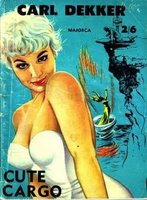 ostensible national holiday is that I am going to collect here some bits of information that, at other times, might have justified individual posts.
ostensible national holiday is that I am going to collect here some bits of information that, at other times, might have justified individual posts.• I’m not the first, and I likely won’t be the last, to point crime fiction enthusiasts toward an excellent essay at the Mystery*File site about Australian pulp fiction. Written by Toni Johnson-Woods, the author of Pulp: A Collectors Book of Pulp Fiction, Pulp Fiction of the 1950s (and now at work on a book about Carter Brown), the piece recalls how government restrictions on soft-covered fiction imported into Australia after 1939 incited resident companies such as Action Comics, Calvert Books, Cleveland Publishing, Horwitz Publications, and Invincible Mysteries to turn for printable stories to “amateur writers such as [Gordon Clive] Bleeck, Alan Geoffrey Yates, and C.J. McKenzie--writers who were willing to work in fiction factory conditions ... [and] who treated writing as a second occupation.” The schedules for these ambitious amateurs were often nothing short of astonishing. As Johnson-Woods explains,
In an effort to feed a fiction-hungry public, authors churned out thousands of words a week. The writing pace was frenetic. Authors such as Gordon Clive Bleeck and Alan G. Yates were writing a new book every two weeks--and published over half-a-million words each year. Yates became known for his ability to write nearly 40,000 words overnight and he confessed ... that sometimes he worked 48 hours straight--thanks to Benzedrine and coffee. The pay was ordinary, about one pound per thousand words. But there was plenty of work available, and, as Yates reminisced, “I’ll have it rather than someone else.”The titles and cover illustrations on some of those classic Aussie pulps--Death in a Nudist Camp, The Wench Is Wicked, Nude in a Boot, Cute Cargo--made them hot commodities. But Johnson-Woods explains that the stories were nothing if not formulaic.
The same scenarios are repeated again and again. The American hero/writer (they are always written in the first-person) is an investigator of some kind (newspaper crime reporter, private eye, insurance company investigator). He is approached (often by a female) to solve a mystery. During the course of the investigation, he drinks copious amounts of alcohol, kisses a number of babes, visits seedy night-clubs, encounters corrupt policemen/politicians, uncovers a “racket” and fights numerous gangsters. At the end of the book, the baddies are banged up and the hero wraps his arm around a babe. All standard hardboiled fare.You can read the whole of Mystery*File’s essay here.
• Steve Hamilton, author of the popular series about reluctant detective Alex McKnight (A Stolen Season, Blood Is the Sky), has won the 2006 Michigan Author Award, sponsored by the Michigan Center for the Book (a program of the Library of Michigan) and the Michigan Library Association. In the latest edition of his newsletter, Hamilton writes: “On October 13th, I get to go to the Renaissance Center in downtown Detroit to accept this [award]. This is the city I was born in, and I remember one of my first jobs was driving from the airport to the Renaissance Center, delivering tax forms. To receive this honor now, well, I’m not even sure what I can say about it. (Elmore Leonard won this award back in 1996, by the way, so we have that in common now. Very cool.)”
• Hot diggity! The British online mag Shots has posted a slew of new offerings, after what seemed like a pretty serious dry spell. In his column, anthologist/editor Mike Ripley remarks on the inadvisability of UK writers playing with guns, this summer’s presentation of the Duncan Lawrie Dagger Awards, the reissuing of Per Wahlöö and Maj Sjöwall’s Martin Beck novels, and the return of author Justin Scott (McMansion). Additionally, Shots presents fresh interviews with Laura Wilson (A Thousand Lies), Ray Banks (Saturday’s Child), Jimmy Lee Shreeve (Blood Rites), and Daniel K. Longman (Criminal Wirral). Now, if the editors could just get “New York correspondent” Dirk Robertson to deliver a new column (the most recent one dates from June) ...
 • It took a little while, but the panel schedule for Boucheron 2006 (to be held September 28 through October 1 in Madison, Wisconsin) has finally been released. Registered participants should click here to begin figuring out how they can make the best use of their time at this event. There will be plenty to take in, as usual.
• It took a little while, but the panel schedule for Boucheron 2006 (to be held September 28 through October 1 in Madison, Wisconsin) has finally been released. Registered participants should click here to begin figuring out how they can make the best use of their time at this event. There will be plenty to take in, as usual.• Finally, following up on an item I wrote back in July, regarding the Sleuth Channel’s online survey to determine the most memorable TV and movie detectives of all time (or at least of the last half century), it seems that polling has closed. And the cable channel’s 90-minute broadcast special based on the results of that survey, America’s Top Sleuths, originally planned to debut later this month, has now been pushed back to Friday, October 20, at 8 p.m. See the Sleuth Channel Web site for more details.

















No comments:
Post a Comment